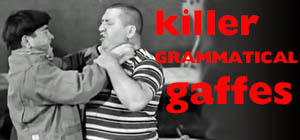


Murdering the King’s English: Grammatical Gaffes Can Kill Your Communications
[by Howard Fencl, Hennes Communications] His Former Royal Highness Prince Harry dropped a grammatical bomb on all the world in a speech cutting his royal ties:
“The decision that I have made for my wife and I to step back is not one I made lightly.”
What’s wrong with this picture?
Give up?
Forbes contributor Rob Asghar penned a splendid article using Harry’s botch-up to underscore heinous grammatical blunders that have become an all too common – and in many regrettable cases, accepted – linguistic trend.
There’s nothing like a glaring grammatical gaffe to scotch the communication you’ve worked so carefully to present. Whether that’s an email you write, a speech you deliver, a video you upload or a text message you pop off, drop one grammatically incorrect gem and I guarantee that your message will be immediately lost on your audience. Their focus – and their takeaway – will be all about your syntactic slip.
A few nuggets from Mr. Asghar’s post bear reinforcement. His admonitions are genteel, yet today, these common errors somehow manage to elude the shame they deserve:
- Remember that you’re too good to misuse your, even if everyone else today seems to be misusing it.
- Don’t confuse who’s and whose. Who’s attending the meeting? And whose presentation is this?
- Never say that you should of read the briefing. You should have read it.
- For the love of all that is holy, don’t be one of those people who calls a colleague a looser. For one thing, it probably violates your organization’s principles of civility. For another thing, you lose others’ respect for such a bungle.
Other grammatical gaffes that grind my gears have also become common:
As in “…my colleague and myself gave a presentation.” What if you gave the presentation solo? Would you say “Myself gave a presentation?” Please tell me no.
I can’t explain this one, other than to opine that chronic abusers may sense that using “myself” lends grammatical erudition to their communication. It does not.
- “When it comes to…”
Example: “When it comes to video trends, more people are watching video on demand than traditional linear video.” You NEVER need to preface a sentence with “…when it comes to.” When WHAT comes to WHAT? Just get to the point: “More people are watching video on demand than traditional linear video.”
I’m convinced this is just placeholder language people use to buy a second or two to collect their thoughts before making a statement. To my dismay, this unnecessary verbiage appeared almost daily in my newsroom on scripts. My most strident grammatical harangue could not stop it. It’s still rampant on any network or cable news show you dial up.
- “Here’s the thing…”
Just tell me the thing.
Will civilization come undone because of these grammatical bugaboos? Of course not. But if we want our audiences laser focused on our messages, we need to be more attentive to how we’re saying what we’re saying, agree?
Even the Three Stooges’ Curly Howard saw the need. I’m recalling this academic exchange from “Dizzy Pilots” – roll :43 seconds into this clip to see it. When the Stooges can’t fit a plane through hangar doors and Curly starts sawing off the plane’s wings as a solution, Moe gives him marching orders:
“Don’t saw the wings, you saw the garage!” Moe barks.
“I see the garage, but I don’t saw the garage,” offers Curly. “You are speaking incorrectly. You are MOIDERING the King’s English!”